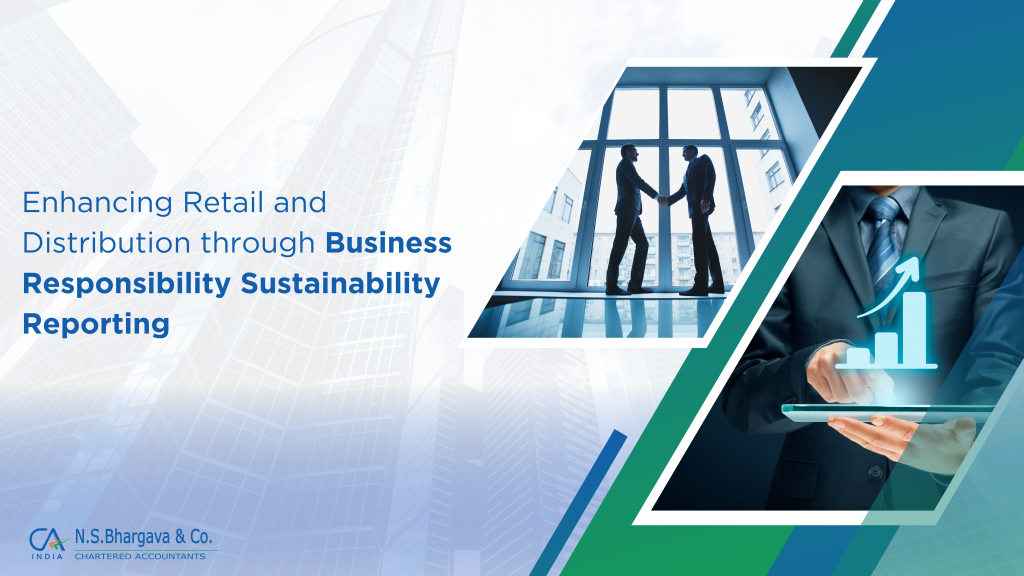
Businesses these days are increasingly scrutinized for their environmental, social, and governance (ESG) practices, the retail and distribution industries stand at the forefront of this examination. With their extensive supply chains, significant environmental footprint, and direct interaction with consumers, companies in these sectors wield considerable influence over global sustainability efforts. Embracing Business Responsibility Sustainability Reporting (BRSR) principles offers a strategic pathway for retail and distribution businesses to address these challenges while fostering resilience and growth.
BRSR involves the integration of ESG considerations into business operations, coupled with transparent reporting on performance against these factors. For retail and distribution companies, BRSR encompasses a wide range of activities, including sustainable sourcing, ethical labor practices, energy efficiency, waste reduction, and community engagement. By measuring and disclosing their impact on society and the environment, companies can enhance accountability, build trust, and drive positive change.
Key Areas of Application
1. Supply Chain Transparency and Ethical Sourcing
BRSR helps retail and distribution industries manage global supply chains, identifying risks and ensuring ethical compliance. It promotes transparency, accountability, and mitigates labor, environmental, and reputational risks
2. Environmental Stewardship and Resource Efficiency
BRSR promotes sustainable practices in retail and distribution, urging companies to use renewable energy, reduce waste, and initiate recycling efforts. By enhancing resource efficiency and minimizing environmental impact, businesses cut costs, boost brand reputation, and support broader sustainability objectives.
3. Employee Well-being and Diversity
The retail and distribution sectors, employing millions globally, prioritize workforce management for corporate responsibility. BRSR mandates fair labor, employee health, safety, and workplace diversity. Investing in employee well-being and inclusivity enhances talent attraction, retention, productivity, and social license to operate.
4. Customer Engagement and Product Responsibility
With consumer demand shifting towards sustainability, retail and distribution firms must provide responsibly sourced products. BRSR prompts companies to interact with customers, share product details, and disclose sourcing and manufacturing processes. Aligning with consumer values enhances brand loyalty, boosts sales, and sets companies apart in the market.
In conclusion, Business Responsibility Sustainability Reporting holds immense potential for transforming the retail and distribution industries. By integrating ESG considerations into business strategies, companies can enhance transparency, accountability, and performance, while driving positive social and environmental impact. As consumer expectations continue to evolve, embracing BRSR principles is not just a moral imperative but also a strategic necessity for companies seeking to thrive in an increasingly complex and interconnected world. It's time for the retail and distribution industries to embrace BRSR and lead the way towards a more sustainable and equitable future.
Key Insights
Strategic Imperative: Embracing Business Responsibility Sustainability Reporting (BRSR) is no longer optional but rather a strategic imperative for retail and distribution companies. It enables them to address societal and environmental challenges while fostering resilience and growth.
Holistic Approach: BRSR encompasses a wide range of activities, including supply chain transparency, environmental stewardship, employee well-being, and customer engagement. Adopting a holistic approach to sustainability reporting allows companies to address multiple stakeholders' interests and concerns.
Brand Differentiation: Companies that embrace BRSR principles can differentiate themselves as leaders in sustainability, enhancing their brand reputation and competitive advantage. By aligning with consumer values and preferences, companies can drive brand loyalty and attract socially conscious consumers.
Risk Management: BRSR enables companies to identify and mitigate risks associated with environmental, social, and governance issues. By proactively addressing risks such as supply chain disruptions and regulatory non-compliance, companies can enhance resilience and business continuity.
The Way Forward
Looking ahead, the future success of the retail and distribution industries will depend on their ability to embrace and integrate BRSR principles into business strategies. To capitalize on the opportunities presented by sustainability, companies should consider the following:
Commit to Continuous Improvement: Embrace a culture of continuous improvement and innovation to enhance sustainability performance continually. Regularly review and update sustainability strategies, targets, and initiatives to stay aligned with evolving stakeholder expectations and industry best practices.
Invest in Data and Technology: Leverage data analytics and technology solutions to track, measure, and report on ESG performance accurately and transparently. Invest in digital tools and platforms that enable real-time monitoring of sustainability metrics across the supply chain and facilitate stakeholder engagement.
Collaborate Across Value Chains: Foster collaboration with suppliers, partners, and other stakeholders to address sustainability challenges collectively and drive systemic change. Engage in industry initiatives, partnerships, and multi-stakeholder platforms to share best practices, leverage resources, and scale impact.
Educate and Empower Stakeholders: Educate and empower stakeholders, including customers, employees, investors, and communities, to actively participate in sustainability initiatives. Raise awareness about the importance of BRSR and provide stakeholders with the information and tools they need to make informed decisions and drive positive change.
Advocate for Policy Change: Advocate for policy change at the local, national, and international levels to create an enabling environment for sustainable business practices. Engage with policymakers, industry associations, and civil society organizations to promote regulations and incentives that support sustainability and responsible business conduct.